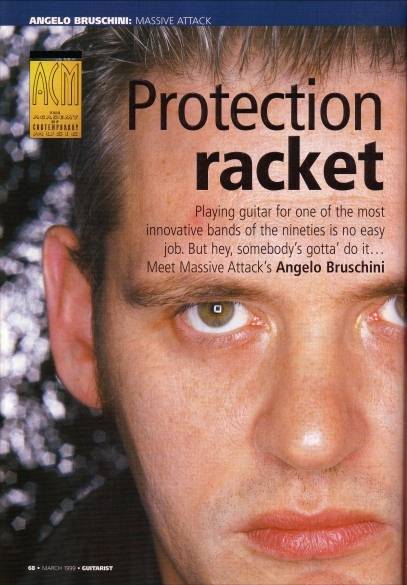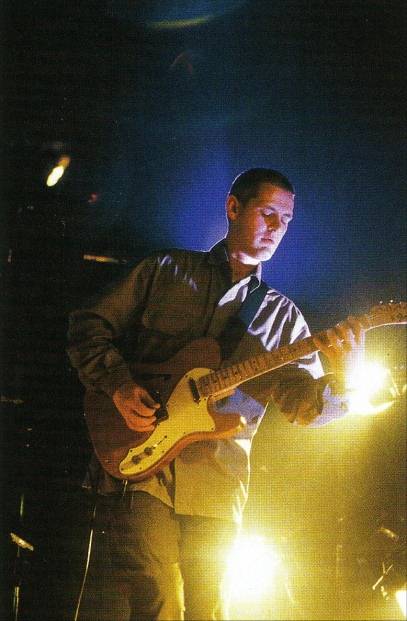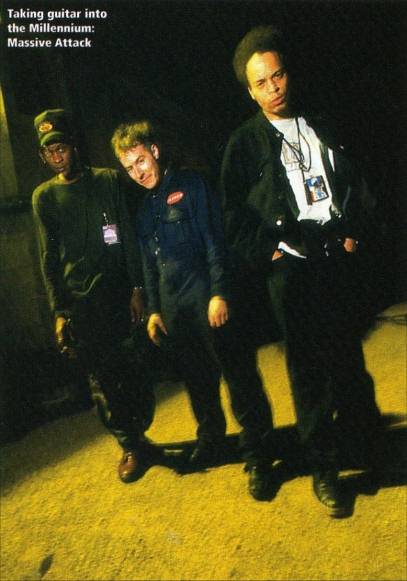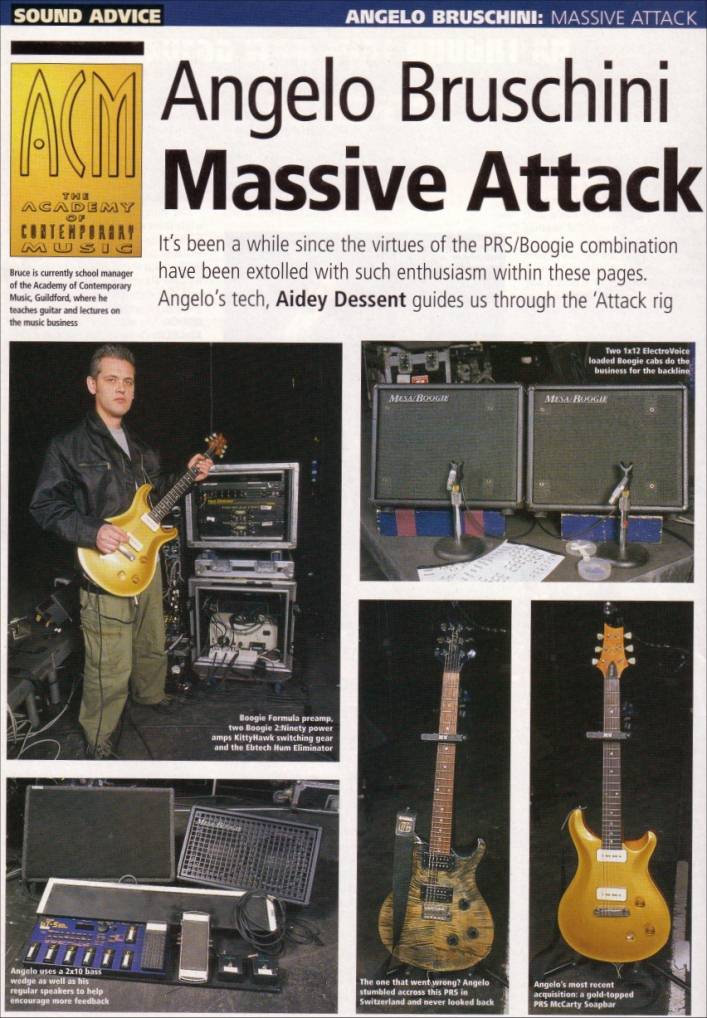
THIS MONTH IN SOUND Advice, we continue our search for the ultimate in cool guitar jobs. And let's be honest, they don't come much cooler than Angelo Bruschini's current enlistment as six-stringer for ambient innovators Massive Attack.
While words are wasted on the demise of the guitar in popular music, it's time we stopped feeling sorry for ourselves and realised that the guitar is alive and thriving in one of its newly creative guises: as a fully blown member of the ambient dance scene. To discover more, we tracked down Mr Bruschini, along with his effervescent antipodean guitar tech Aidey Dessent, to discuss the future for the modern guitarist and the sort of gear He'll need for the journey.
BRUCE: Angelo, tell us about your background as a player and how you came.
upon the Massive Attack job.
ANGELO: I've lived and played in Bristol most of my life, and I was in a band
called The Blue Aeroplanes which had three guitarists. I started off as the
third guitarist and by the end,
I was writing stuff for them. Then I got
a call from a friend saying he
had Massive Attack in for a session and
they wanted a guitarist. So I did the
session and left it thinking I'd
been dreadful, bloody awful, and I didn't
hear anything for about six months.
Then the album 'Protection' came out and
I just happened to recognise quite
a few samples!
When they first started playing live, Massive Attack were literally
guys with decks doing a bit of vocals. Then Portishead came along and did a
live band
thing in the same style. So first they brought
in keyboards and then bass,
and then I got a phone call asking
if I wanted to go on tour with Massive Attack
in three days' time! So I just
dropped everything because I really liked
the music. I thought to play
with people like that, and to play
that kind of music would be a challenge.
I was getting a bit bored jangling
away on the indie scene, and this seemed
like a way of getting into more modern
computer music.
Guitarists have to do that-you just can't continue to plug into
an amp any more. Well, you can if you want to, but professionally, you just can't
do that
- you have to have your own computer,
you've got to know how it all
works and you have to be adept at sampling
yourself.
BRUCE: Massive Attack are renowned for using loops and samples, so what do
you
think the guitar adds?
ANGELO: Humanity. While we were doing the album, we were sticking stuff through
my amps all the time just to mess it up; one problem with the digital domain
is that it's too clean - even the bass.
You can have the pure source of the
sounds, but we want to screw them up and the best way to do that is to use
analogue things, like a guitarist. Even if
I wanted to, I couldn't play the
same every night. I wanted to get
a certain feedback note, so we put marks
on the floor and if I stood in a certain
place I might get it, but it wasn't
too successful. That was when Aidey came up with the idea of the wedge in front
of me with the second volume control. Once we did that, the markers on the
floor were absolutely accurate.

BRUCE: What about the difference in the amount of guitar you play live compared
with on the album?
ANGELO: Well live there are areas where it's multi-layered, so me and Michael,
the keyboard player, sat down and came up with the lines that I could play
and the ones that have to come
from the machines. Quite often I'm playing
stuff and you'll hear two or
three other guitars coming in, which
is purely because I can't play
them - Mike's got the other guitars
on his keyboard. That was the
only way we could do it because there are more guitars on the album than I
can play.
When we recorded the album, I fed the guitar straight into the computer and
then cut it about. It was a case of trying to make it raoflike a guitar; use
the sounds and the feedback and
choppy chords, but cut it up so it didn't
sound normal or traditional. I'd go in and
record all night and then go in the next
day to listen to the track
and say 'who played that', and they'd
say 'you did'. They cut it up so
much that I didn't even recognise my own playing!
A lot of it's done by the
producer; he'll say, 'have a listen
to this, this is ass backwards to how you
played it... now play it like that...'
BRUCE: Who was it that made you pick up the guitar in the first place?
ANGELO: My brother. He got a guitar one Christmas and he lasted a week with
it, then I picked it up and I've never looked back. I must have been seven
or eight. I think my first influence
was Dave Hill from Slade; I saw
them play live and it was the loudest thing
I've ever heard in my life.
That was when I realised that this was what
I wanted to do.
Then I just started playing along to records; Stax and Al Green, and I think
that it's the best thing I could have done because it meant I was already playing
with other musicians. I was also
influenced by Richard Thompson - he blew my
head off when I saw him with Fairport
Convention. He was amazing and
he opened my eyes to a whole world
beyond the blues scale. Later on, Joey
Santiago from The Pixies because
he was so inventive. But I've
tried not to sound like a blues guitarist
- Eric Clapton makes me
fall asleep - I just wanted to go in
other directions and keep the old brain alive. I prefer textures to guitar
solos, I'm much more involved in the emotional side of it.
BRUCE: What about
guitars, do you have a favourite or favourites?
ANGELO: I used to use a Guild
175 because they were feedback kings. They're the best at feedback, but they're
buggers to control so I had to adapt my technique. But when I started doing
large gigs with Aidey, I didn't want
it on tour any more... especially
as that Guild was priceless.
We were in Switzerland looking at these Framus
semi-acoustics to try and replace the Guild. I thought the necks were dreadful,
but these other guitars were
there so I picked up this one
which had been sent back because the colour
had gone wrong, and it was genius. It never went out of tune, it was solid
as a rock and it got brilliant feedback. It was the 24-fret PRS with a heavy
maple
top on it. I'd never played PRS before
'cos I thought they were metal guitars,
but they're just amazing. I have a McCarty
gold top with P90's as well..
I also have a Strat which I use for one song; it's a bog-standard Squier, but
when Squiers first came out there was a batch of them that were really well
made with a really nice sound, and
I've never found another one that can
match it.
BRUCE: Can you tell me about your live amp and effects set up?
ANCELO; Well
we had to work a way of doing as much of the stuff from the studio in a live
situation. So live, I use a BOSS GT5, but I threw away the presets
and started again. Y'know,
I wanted the flanger before the phaser; stuff like that. One of the great things
about the GT5 is that you can put anything in any order at any time. The amp
simulations are brilliant, except now we have the new Mesa/ Boogie Formula
preamp, so I can get proper clean
or proper dirty sounds.
BRUCE: Aidey, what's the motivation behind Angelo's set-up?
AIDEY: The set-up
was designed specifically for the way Angelo plays because he uses lots of
feedback. So instead of just having everything ridiculously
loud and annoying the shit
out of everyone, I came up with something where
he has a little 2x10 Boogie bass
wedge next to his normal monitors. This
is wound in via another volume
pedal to get the feedback coming back at
him rather than cranking up
the amp from behind. Also the whole
thing is stereo, so you can
find a point between the wedge and the
speakers behind you where you can
surround yourself and get involved
in your own little world without
being outrageously loud.
BRUCE: How is Angelo's rig set up?
AIDEY: The GT5 does the preamp, distortion and effects thing, and that's split
off into two Mesa/Boogie power amps; one to drive the wedge and one to drive
the rear cabinets, which are
both ElectroVoice-loaded 1x12 Mesa
cabs. That's switched by a Kitty Hawk
loop switching device, so we can
keep adding all sorts of things. There's
also now a brand-new Boogie Formula
preamp which we're incorporating
bit by bit, which is really good.
The preamp is run from the send and returns
from the GT5, rather than
the other way around. This was down
to experience really, because I'd
built a loom with so many ways in it,
so rather than build a whole new
loom, we thought we'd just try it -
and it worked! But the purists would
be horrified!
The silver volume pedal controls the level of the Boogie wedge
coming back at you, and the two switches to the right of that can be allocated
to do all
sorts of things with the GT5.
The only other thing in there really is the
Ebtech Hum Eliminator. They're great because you can spend hours and hours chasing
hums in systems like this,
so this is the lazy way out. It's
passive and you just plug in and out of it and it works like an isolation
device. That's about it, it's quite simple really.
BRUCE: Angelo, what was
the last thing you learned and what are you practising at the moment?
ANGELO:
I'm not practising at the moment because I play every day for two hours at
the gigs. I keep these sections within certain songs where I don't know what
I'm going to do. I try to keep
these bits as open as possible to
try things out - sometimes you do
something and everyone turns round and
goes 'where did that come from'!
BRUCE: When it comes to modern players, do you have any favourites?
ANGELO: No. Truthfully I hate players like Satriani because it's meaningless
to me. I can play pretty fast myself, not as fast as him, but I can do it and
it's just meaningless. When
you're learning - especially in your early
years - technique is really important.
But once you've got your
technique,
it's what you do with it that becomes important.
It's all about
becoming a good musician, like Graham Coxon
from Blur or Joey Santiago from
the Pixies for example.
Keith Richards is a god; a man who can play one chord
and make it sound genius. Also the old jazzers Charlie Christian's amazing,
andWes Montgomery of course...
The thing about Satriani is that while there's a lot of crap, there must be
some really good tunes there as well, but I can't be bothered with the fight
to find them. I'd rather listen
to Richard Thompson and know damn well that
eight out of ten tunes are going
to be gems.

BRUCE: Any nightmare stories?
ANGELO: The first time I picked up a PRS was in Switzerland, and Baba - the
Swiss importer - wanted Swiss francs rather than pounds. So the tour manager
gave me some money to change into francs,
and I didn't want to walk to the
bank with £2,000
by myself so I took Winston and Horace Andy with me. We got there, I handed
it over, but it just wasn't coming
back. Horace was in the bank with me and
Winston was outside having a fag,
when these security guards appeared
from nowhere and started to clear
everyone out of the bank. After a while we
were the only people left
and the money still hadn't been
changed. So I asked if I could have my
money back but the bank manager
came over and started asking me where
the money had come from. Then the front
doors opened and six armed police came
in and started to question
us about the money, asking us
where our passports were and who
we were. By now I was freaking out
because they had my money, I was
surrounded by six armed police and Horace
was being held down
by two other guys. It turns out that
they thought that there was a great
big drug deal going on. Eventually
it took the tour manager to
turn up with our passports and about
half an hour of negotiation to calm them
down
BRUCE: Any words of advice for young up-and-coming players?
ANGELO: Don't give up. You'll get a million knock-backs,
especially in the music industry because it fluctuates all the time. One minute
you've got loads
of money, the next you can't land
a job for a year. So just don't give
up.









